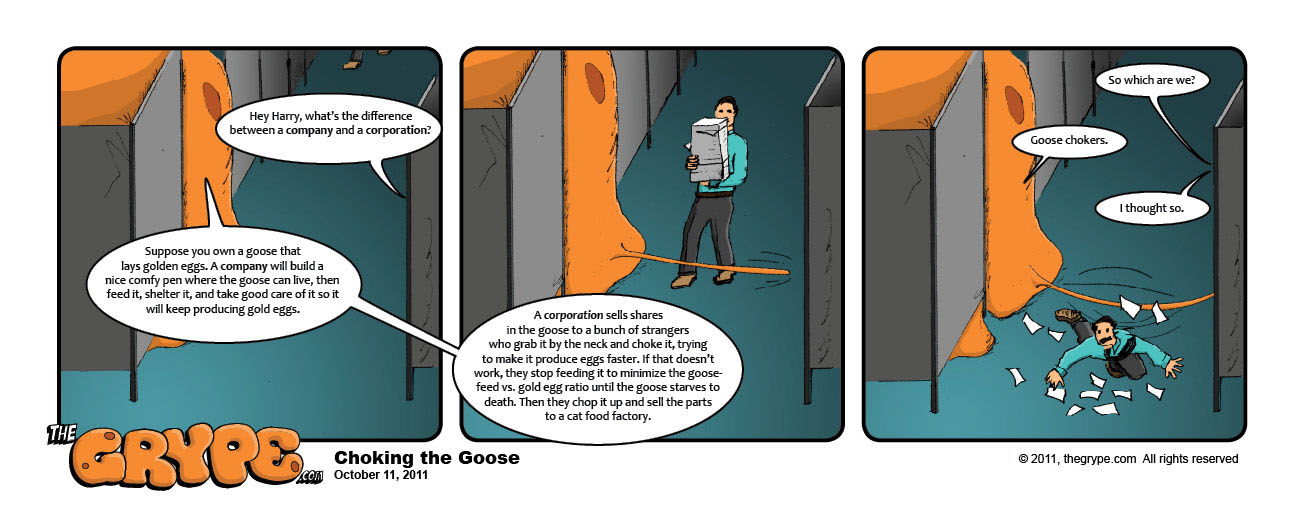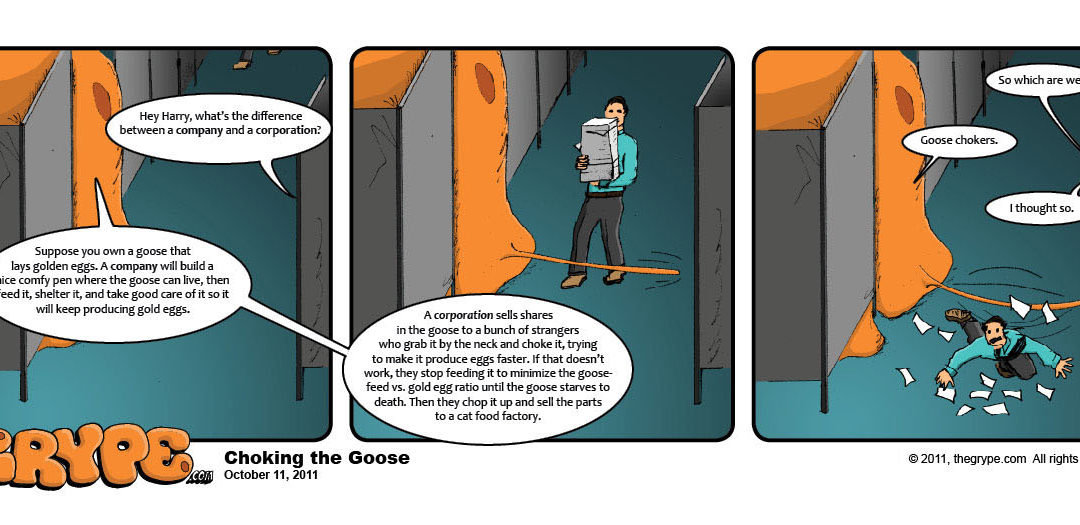 The dictionary defines a corporation as “a registered business entity considered by the government to have the same legal rights as a person.” Which doesn’t sound too sinister or threatening. They are often just benign companies with a bit of extra legal protection under the law. But… when the assets of a corporation get divided into shares of stock sold to external investors, things change. As joint owners of the corporation, shareholders gain certain rights— to sell, trade, or buy new shares, nominate and elect a Board of Directors to run the corporation, propose shareholder resolutions, share any declared dividends, and— the big kahuna—they usually have the right to share any corporate assets after a liquidation.
The dictionary defines a corporation as “a registered business entity considered by the government to have the same legal rights as a person.” Which doesn’t sound too sinister or threatening. They are often just benign companies with a bit of extra legal protection under the law. But… when the assets of a corporation get divided into shares of stock sold to external investors, things change. As joint owners of the corporation, shareholders gain certain rights— to sell, trade, or buy new shares, nominate and elect a Board of Directors to run the corporation, propose shareholder resolutions, share any declared dividends, and— the big kahuna—they usually have the right to share any corporate assets after a liquidation.
But, hey, that’s not a problem since the shareholders earnestly care about the future of their corporation and want to keep it productive, right?
Not always. Corporate liquidation has always been an ugly facet of doing business, but there was a palpable shift in attitude during the horrendously short-sighted “expand or die” corporate profit mania of the 1980’s. Informal gangs of greedy yuppie entrepreneurs suddenly realized that rather than investing years of hard work to keep a corporation fiscally solvent, one could instead borrow the required investment cash from external short-term lenders to buy enough stock in a struggling company to hijack its Board of Directors. Once in charge, these newly-crowned majority owners could simply dissolve and liquify the corporation, dismantling it to sell pieces of it to the highest bidder. This process was fittingly dubbed “Corporate Piracy.” If the other stockholders of the corporation balked at the plan and resisted, things turned ugly and a legal fight ensued for corporate control. This was called (again, appropriately) a “Hostile Takeover.”
Despite a rash of inane Hollywood movies dealing with the topic (“Other People’s Money,” etc.), the seizure and systematic destruction of a corporation is rarely cute or funny. In real life nobody relents and “rescues the endangered family business” in the final reel… this was all some seriously devastating shit that gouged vast furrows of ruin through the American corporate landscape. Companies that had quietly turned a profit for decades providing long term employment to entire communities were suddenly branded “obsolete”— because they didn’t make money fast enough—and got unceremoniously dismantled, their hard-won assets served up on a platter to feed the hungry furnaces of cutthroat finance.
Drunk on the success of these tactics, this first wave of pirates— many now overnight multi-millionaires— were themselves absorbed or pushed aside when bigger players swooped in to institutionalize the process. Call them “Corporate Privateers,” since like historical privateers they were essentially given free rein by their government to pillage and loot at their whim. Slaughter ensued as hundreds of companies were chopped up for spare parts.
It turns out that exploiting corporate vulnerability to such predatory tactics is a great way for people who already have money to use that money to cannibalize the American Dream and sell it off, a piece at a time, in order to make more money. See where I’m going with this?
Why work hard to build something your own when you can just sell someone else’s farm? The morally bankrupt yuppie philosophy mistakenly touted as the ultimate mantra of Capitalism— that supposedly “Greed is Good”— is a smokescreen. The raiders have set up shop. Their business is acquisitions, and they’ve skimmed the cream so completely off the top that our formerly-mighty production economy is becoming a lowly service economy wherein the children of once-proud makers and builders are doomed to a lifetime of running cash registers and serving fast food. Most of the river of wealth is dammed upstream, diverted to the purposes of the monied elite.
My advice? To paraphrase the words of a certain cinematic Disney pirate: You’d best start believing in Plutocracies… because you’re in one.

